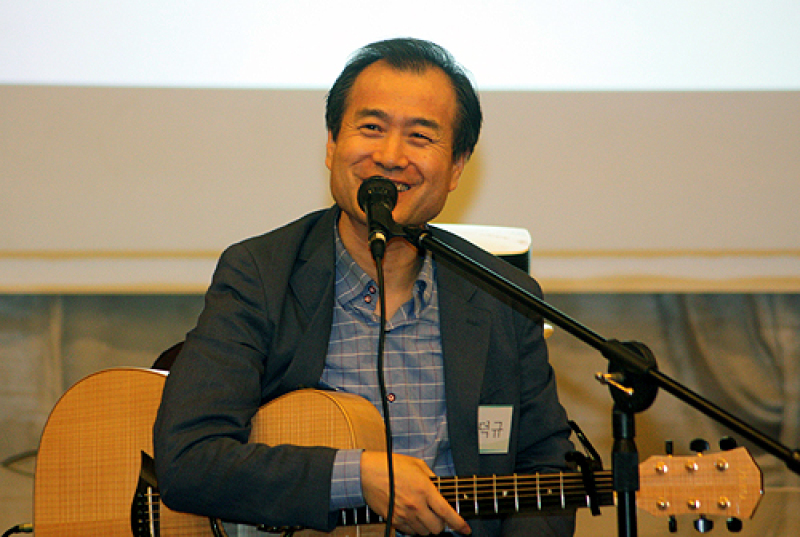

Professor Duk Kyu Ha, who was once a renowned mainstream musician in Korea, decided to give up the big stages to create music that instead brings meaning and joy to those who listen.
Professor Duk-Kyu Ha, a singer who had been popular in the "80s, and shared the testimonies of his life as a musician.
"As I was attending an arts school in Korea, I had this desire in me to study abroad in the U.S.," shared Professor Ha. "But I had no finances to go. At the time, I knew that I had some potential musically so I've been making music as an amateur, so I decided to release an album and make money as a singer. And I got lucky, so I got to perform on a TV show, and was noticed by a producer who then recruited me and allowed me to start my career as a professional singer."
But Professor Ha said that he did not find joy in simply being a mainstream musical artist.
"The world of broadcast entertainment was not for me. I had this burden to succeed, but things just didn't work out the way I wanted them to," he said. It was at that time that his life was changed by the film, "Bound for Glory' (1976).
In 1982, Professor Ha wrote songs and created artistic projects during his life alone in his studio, but one night, he came across "Bound for Glory,' an American film based on the life of Woody Guthrie, the "father of folk,' playing on his black and white TV set. The film is set during the time of the economic depression in the U.S., and at the time, Guthrie was a well-known musician. However, he let go of an opportunity that could have made him even more famous, and started hosting concerts for the poor and those who had lost their homes during the depression. His actions brought about much comfort to many people. Guthrie also became a peace activist, and a civil rights activist against discrimination, and was even considered as a father figure to the renowned Bob Dylan.
After watching the film, Professor Ha felt ashamed that he had wanted to use music for his own success, and decided to create music to bring joy to other people. And instead of simply giving messages of happiness, he decided he wanted to share the meaning of life.
Professor Ha no longer performed on mainstream media shows, and performed meaningful music in unseen places and met like-minded musicians along the way.
One of the songs that he released at the time was "Journal of Love,' which he sang with much emotions to his students:
"On the twilight wrinkles of my father,
On the steadfast smile of my friend standing alone on a deserted land,
I write, I love you"
After having completed this song, Professor Ha met Chun Ho Hahm, with whom he wrote a song together. They lived together in a small rooftop apartment for a while, eating and practicing music together.
However, the two of them decided to part ways. Professor Ha had converted to Christianity at the time, and decided not to perform for any mainstream media, whereas Hahm decided he wanted to continue on to perform for bigger stages and mainstream audiences.
"I still meet with him once in a while," Professor Ha said. "We perform together sometimes, and last year, I met and performed with him quite often in Busan."
The more that time passed, however, Professor Ha realized that he did not live up to the standards that his own music set, and he started to become depressed.
"My heart was burdened with selfishness, ambition, hate, and so many other things," he recalled. "I thought, Is there any way I can lessen the gap between my life and my music? As I was looking into my heart during this difficult time, I realized that there was too much of myself in me," he said.
Thus, he created "Thornbush" during this time, which goes,
"There is too much of myself in me
There is no place for You to rest
Because of the winds blowing in vain in me
There is no place for You to rest"
"Honestly, we are selfish and self-centered. Because we are self-centered, we want to win in competitions," he said. "In the world, the strong still take advantage of the weak. The world lives only for selfish desires. The reason we study, the reason we want to be happy, it's all for selfish desires. Selfish desires have become the icon of our generation."
"But I realized that the fulfilling of our selfish desires cannot lead us to joy," he continued. "Actually, joy comes not from fulfilling selfish desires, but from denying ourselves. I still continue to have selfish tendencies in me, but I'm wrestling a lot to overcome it," he said.
"If we start trying little by little to give ourselves up and deny ourselves, I think we will find joy in that," he said. "People have this desire for a community and belonging within them. It's one of the reasons that people get married and have families. It's also one of the reasons that people commit suicide when they feel isolated. I want to sing songs that fill the need for belonging and community. I want to tell people that we all are not alone. Yes, we may get hurt from time to time, but as long as we remember that we are part of one community, I think that is the start of living selflessly."


















